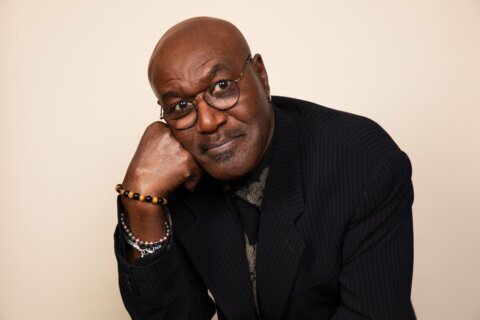WASHINGTON — Is the next great filmmaker living right in our midst in the nation’s capital?
Budding talents will screen their hungry, passionate, painstaking work at the 27th annual Rosebud Film Festival, which runs Friday to Sunday at The Miracle Theatre on Barracks Row.
“Rosebud was started in 1990 by Natasha Reatig, an Arlington community member who wanted to create a festival that would circumvent the norm,” festival director Kevin Sampson told WTOP. “We look at films that are innovative, unusual, experimental and deeply personal.”
While past years have been exclusive to DMV filmmakers, this year is casting a wider net.
“We decided to unleash the chains of just D.C., Maryland and Virginia filmmakers and let the rest of the world in,” Sampson said. “We’re still honoring our old tradition of earmarking one of our five $1,000 cash prizes for Best DMV Film. But it’s amazing — submissions doubled.”
This year, judges received 125 submissions, which were narrowed down to the best 34 films. Each film block costs $15, or you can drop $40 for an all-access pass to the entire weekend.
Friday
Friday’s slate features Zhibo Lai’s “A Time Before,” which plays like “Memento” meets “Birdman,” as it uses a reversed narrative and a single-take to explore newlywed secrets.
“What I love about this film is that it’s basically done all in one take, but as the film moves forward, time moves backward,” Sampson said. “So, you’re able to look at this story — and it tells you this story arc kind of in the reverse — but it’s all done in one take! So for the film nerd in me, I’m like, ‘Oh my goodness, I don’t think I’ve ever seen anything done like this.'”
Friday also brings Marcey Frutchey’s “The Importance of Finding the Other.”
“It’s about a young, biracial girl named Iris, who sets out to discover what it means to be an other,” Sampson said. “She’s filling out one of those forms for school and she can’t figure out what to mark. She’s like, ‘What is the other?’ So she actually encounters a pair of immigrants, a homeless veteran and a transgender female all to bring that answer to light.”
Also, be sure to check out local filmmaker Katie Sheridan’s “Unknown.”
“Basically, it’s just four young guys who are street performers in D.C.,” Sampson said. “They go around and set up shop, the full band and everything. It’s just a quick, six-minute look at their life, but again with that D.C.-area vibe. It’s a really cool film.”
Opening night closes with Steve Tringali and Maria Bissell’s “Corridor Four,” which won Best Documentary Feature at the 2017 Washington West Film Festival. The film chronicles the brave heroics and therapeutic aftermath of 9/11 Pentagon first responder Isaac Ho’opi’i.
“It’s the first-ever look at how the Pentagon handled mental health care after the Sept. 11 terrorist attacks,” Sampson said. “Highlighting the Arlington area, it’s a really well-done film.”
“He still didn’t feel like he had done enough and he really had survivor’s guilt,” Tringali said. “While there’s lots of hardship, it ultimately is a warm, feel-good story. The love between him and his family was so great that he was able to move past this traumatic situation.”
Saturday
Saturday morning brings Melanie Mayron’s “Snapshots,” starring Piper Laurie (“Carrie”).
“It’s a family film,” Sampson said. “A grandmother’s secret past collides with her granddaughter’s present/future, so it’s an unraveling tale. I don’t want to give too much away.”
You can also watch former NBA star turned actor Rick Fox (“Oz”) in Jeannie Donohoe’s “Game.”
“It’s about a high school new kid on the block who comes to play basketball, so it kind of fit perfectly having [Rick Fox] as the coach of the team,” Sampson said.
Speaking of sports, don’t miss the documentary “She’s Got Grit” by Dara Padwo-Audick.
“This one is really interesting because it’s a video series about female athletes with disabilities who compete at the highest levels,” Sampson said. “This one is tandem bike riding, but the athlete is actually blind, so she really has to trust the person who’s leading. … [Dara] realized so many of these athletes had this leadership quality that she wanted other people to see.”
If you want something lighter, try Antony Beilinsohn’s “Free Advice with Adam Chernick.”
“An 11-year-old stand-up comedian helps adults who may be confused on certain matters,” Sampson said. “He walks around and gives free advice. Adam is such a smart, young man, years ahead of his time. This episode is how to have empathy, so he goes with the parking enforcement folks, because everyone hates meter maids. … It’s really cute, funny, refreshing.”
The closing night film is “The Last of the Manson Girls” by Lonnie Martin, who not only wrote, directed and produced for his American University thesis, but also built the set circa 1969.
“He actually constructed the set and filmed it,” Sampson said in awe. “I mean, come on! You and I made a thesis … but I wasn’t making a set! And a feature film?!? … Very talented.”
In order to realize his vision, Martin actually obtained the rights to the trippy source material.
“The film is a fictionalized version of Paul Krassner’s essay, ‘My Acid Trip with Squeaky Fromme,’ in which he spends 24 hours with the remnants of Charles Manson’s family after Manson and the killers were incarcerated,” Martin told WTOP shortly after Manson’s death.
Sunday
After two days of eclectic screenings, Sunday offers a pair of free panels sponsored by the Virginia Film Office and filmed at Arlington Independent Media in Clarendon, Virginia.
The first panel is called “Student Filmmaking from the Classroom to the Real World.”
“We have professor Giovanna Chesler from GMU, who directs film and video studies; we have Leena Jayaswal from AU, who does the photography concentration; then, Henry Leeker and Harold Jackson III are two Rosebud finalists that have come back. … It’ll be a good discussion: Should I go to film school? Should I not? Pros? Cons? Then, how do you leave school and continue to create? How do you build a community [to] keep making this happen?”
The second panel is called “What Critics Look For.”
“We’ve got our man Tim Gordon, president of [the Washington Area Film Critics Association]; Mae Abdulbaki, founder of Movies with Mae; Cynthia Fuchs of Pop Matters; and Michael Parsons of D.C. Filmdom. We’ll just be talking about what film critics look for in films, but then also how indie filmmakers can actually apply that to their films to make them better.”
It all builds to the award ceremony at Clarendon Ballroom on Sunday night.
“We give away five $1,000 cash prizes to our Top 5 finalists: Best of Show, Best of the DMV and three others,” Sampson said. “I don’t know of any other festival that’s actually putting out [that much cash] … It’s a great way to put money back into the pockets of filmmakers. A lot of them shelled out so much just to make the film. This can either help them slowly recoup, or some [festivals] have taken the money and gone on to shoot a feature. It’s a pretty cool deal.”
In the end, the festival is an enlightening experience for both filmmakers and audiences.
“Filmmakers and artists are really recording the pulse of the climate and the times and what’s really going on in the world,” Sampson said. “Any time you go to a film festival, any time you go into a movie theater, you’re quiet as you watch. … You’re able to think about what you’re seeing and there are a lot of films that will have people thinking, then talking afterward.”
Click here for more information. Hear our full chat with festival director Kevin Sampson below:








